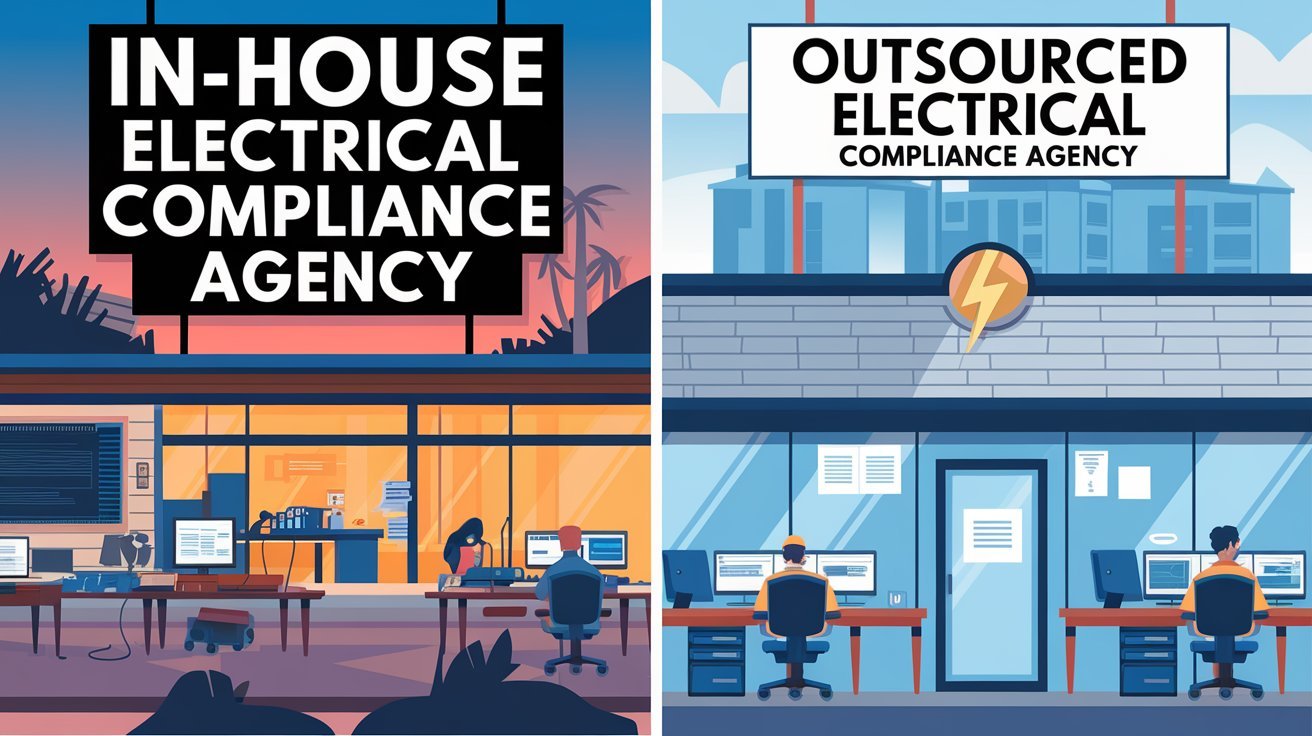Electrical Compliance Agencies: In-House vs. Outsourced Solutions

Electrical compliance is more than just a checkbox. it’s a cornerstone of safety and operational efficiency. Electrical compliance agencies play a vital role in ensuring businesses meet regulations, maintain safe environments, and avoid costly penalties.
This guide explores what electrical compliance agencies do, why they’re crucial in 2025, and how to choose the right one for your needs.
What Are Electrical Compliance Agencies?
Electrical compliance agencies specialize in ensuring that businesses adhere to safety standards and legal requirements for electrical systems. Their work spans industries, including residential, commercial, and industrial sectors.
Key Services Offered:
- Electrical System Audits: Comprehensive reviews to identify hazards and inefficiencies.
- Regulatory Compliance Checks: Ensuring alignment with standards like the National Electrical Code (NEC).
- Testing and Certification: Providing compliance certifications for insurance and legal purposes.
- Routine Maintenance: Regular inspections to prevent future issues.
Electrical compliance agencies ensure safety while protecting businesses from liabilities linked to electrical malfunctions or code violations.
Importance of Electrical Compliance in 2025
Why Electrical Compliance Matters
Electrical compliance is critical for maintaining safety, operational efficiency, and legal adherence. Non-compliance can lead to severe consequences, including accidents, hefty fines, and business disruptions.
For instance, the National Fire Protection Association (NFPA) reports that electrical issues account for over 13% of workplace fires annually, resulting in significant property damage and loss of life.
Key Trends Shaping Electrical Compliance in 2025
- Regulatory Updates: Governments and organizations are introducing stricter safety standards, such as recent NEC updates on renewable energy installations.
- Sustainability Goals: Companies are focusing on energy-efficient systems to align with green initiatives.
- Remote Monitoring: Compliance agencies increasingly use IoT devices to monitor electrical systems in real time, ensuring proactive risk management.
By staying updated, businesses not only prevent liabilities but also enhance their reputation as safety-conscious organizations.
How Electrical Compliance Agencies Operate
Step-by-Step Process
- Initial Assessment: Agencies inspect your facility to identify risks and areas of non-compliance.
- Compliance Roadmap: They provide a tailored plan to meet standards.
- Implementation: Upgrades or repairs are carried out to fix identified issues.
- Certification: Once compliant, businesses receive official certifications.
- Ongoing Support: Many agencies offer periodic inspections to maintain compliance.
Real-world example: A hospital worked with an agency to upgrade its electrical systems, achieving compliance in under 30 days and reducing energy costs by 15%.
Choosing the Right Electrical Compliance Agency (Section 7)
Selecting the right agency is crucial to achieving compliance without unnecessary expenses.
Steps to Evaluate Agencies
- Verify Certifications: Look for accreditations like OSHA, NEC, or ISO to ensure credibility.
- Check Industry Experience: Agencies specializing in your industry will better understand its unique challenges.
- Review Client Testimonials: Positive reviews and case studies indicate reliability and professionalism.
- Request a Transparent Proposal: Ensure pricing and services are clearly outlined to avoid hidden costs.
Questions to Ask Potential Agencies
- Do you provide ongoing maintenance support?
- How long will the compliance process take?
- Can you provide references from past clients?
Example: A retail chain chose an agency with proven expertise in commercial settings, leading to faster compliance and lower energy bills.
What You Gain
- Reduced Liability: Avoid fines that can exceed $50,000 for non-compliance.
- Enhanced Safety: Fewer accidents lead to lower insurance premiums and operational continuity.
- Energy Savings: Optimized systems can cut electricity costs by 10–30%, adding long-term ROI.
Investing in compliance is not just about meeting standards, it’s about safeguarding your business and employees.
Key Takeaways
- Essential Role: Electrical compliance agencies ensure your business meets safety standards and avoids costly penalties.
- Services Provided: From audits and certifications to ongoing maintenance, these agencies cover all aspects of electrical compliance.
- 2025 Trends: Staying updated with regulatory changes is crucial to maintaining compliance and reducing risks.
- Choosing the Right Agency: Look for certifications, industry experience, and transparent pricing to find the best fit.
- Cost vs. Benefit: While compliance has upfront costs, the long-term savings and safety enhancements far outweigh them.
FAQs
What does an electrical compliance agency do?
They inspect, upgrade, and certify electrical systems to meet safety standards.
How often should electrical inspections occur?
Most agencies recommend annual inspections.
What certifications should a compliance agency have?
Look for certifications from OSHA, NEC, or ISO.
How much does electrical compliance cost?
Costs range from $500 for inspections to $20,000 for full upgrades.
Are small businesses required to comply with electrical regulations?
Yes, all businesses must meet applicable electrical safety standards.